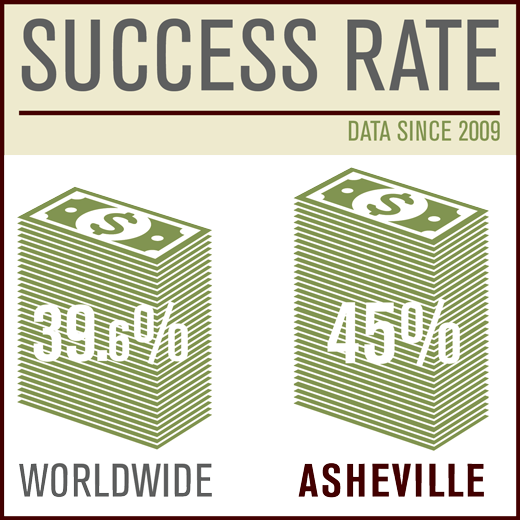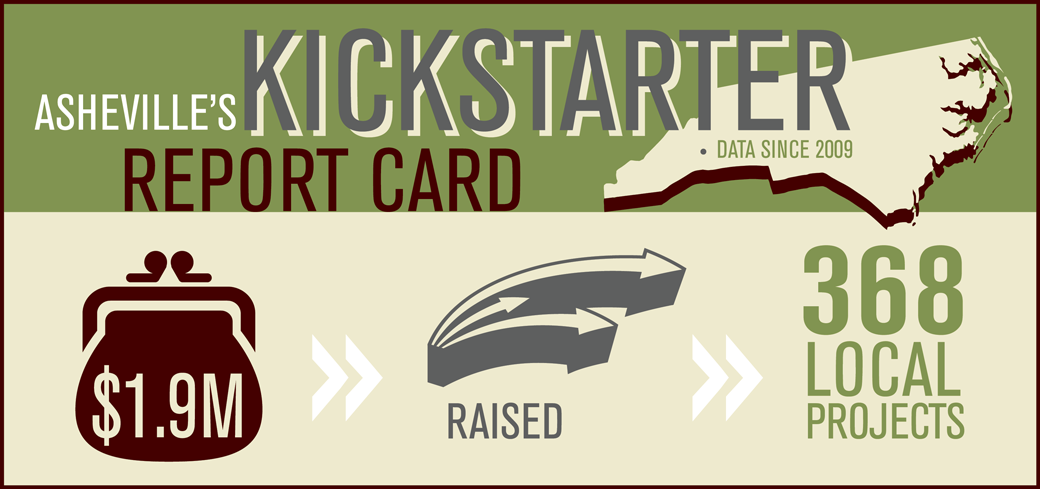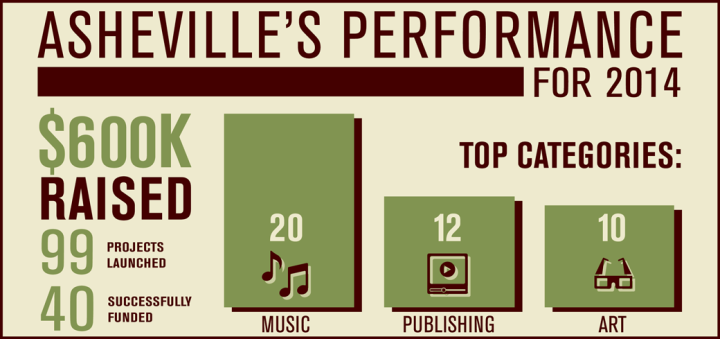Friends, family and fools are frequently cited as the most promising sources of capital for small businesses. And that networking approach to financing — called crowdfunding when it’s leveraged online — seems to suit Ashevilleans, who’ve raised almost $2 million to date for creative ventures funded via Kickstarter.
One of a growing number of crowdfunding platforms, Kickstarter launched in April 2009, and as of this January, Asheville-based campaigns had raised $1.9 million for 368 ventures posted on the popular website, according to Kickstarter representative Justin Kazmark. Perhaps more impressive than the total, though, is the local campaigns’ success rate. Forty-five percent of projects claiming Asheville as their home base reached their funding goals, compared with 39.6 percent for all Kickstarter campaigns worldwide. Those numbers don’t distinguish between local and nonlocal donors, though individuals may choose to include their location in their profile, and project creators often ask donors for an address so they can send rewards.
Either way, however, “A big part of the appeal is that you get to interact and engage with a company or product that you believe in,” explains Kimberly Daggerhart, crowdfunding strategist for the JB Media Group, a local marketing firm. “You’re not just purchasing something; you’re helping to make something happen, and I do think Asheville is the kind of place that really enjoys supporting people’s dreams.” Local support, she notes, “helps to raise the project’s profile, making nonlocals more likely to contribute. … People are more likely to give to a Kickstarter project that already has backers.”
In 2014, more than 40 percent of the 99 Kickstarter projects based here were successfully funded, putting more than $600,000 into the hands of local dreamers and doers. By comparison, the state of North Carolina clocked in at just 27 percent of the 1,334 projects funded last year.
“Any platform that’s reliable and safe is important to help grow a vibrant economy,” says Sam Powers, director of economic development for the city of Asheville. Much like business incubators, peer-to-peer networks and microloans through nonprofits, says Powers, crowdfunding websites give locals an additional alternative to conventional bank loans.
“Venture capital and equity firms have been active in many larger metro areas, but more limited here in the mountains,” he explains. “A Kickstarter cumulative total of $1.9 million since 2009 would be an important supplement to the mix of financing.”
Although there are no strict criteria for launching a Kickstarter project — last year, for example, 6,911 people pledged $55,492 online to a Columbus, Ohio, man who “set out to make potato salad” — many campaigns blend creativity and entrepreneurship. Beyond that, says Daggerhart, there are several other factors that can help a pitch stand out and attract backers.
“The [noteworthy] projects I have worked with from Asheville were world-changing in some way, and I think that makes them appealing beyond just the local audience,” she points out. “They become nationally and globally appealing.”
Two of the top Asheville-based projects she’s consulted on, she says, were Appalatch’s 3-D printed sweater, which boasts zero waste and an ethical supply chain, and Outrider USA’s Horizon Trike, which was designed to empower adventurous but disabled riders. The sweater raised $55,272; the trike, the most successful of her clients’ projects to date, generated $126,231 in one month. Those products’ backstories, she says, added another level of interest, helping them appeal to a broad audience beyond Western North Carolina.

Daggerhart’s formula for success: “People who are interesting, authentic and inspirational combined with a really great, often world-changing idea. Those things together are incredibly compelling.” In addition, she continues, “It is somewhat easier for an existing business to get community support. You have to have the crowd before the funding, so if you’ve been in business for a while, you’ve probably engaged your community.”
Although Daggerhart cites large-scale success stories, smaller-scope ventures such as record releases, art exhibits and documentaries can also thrive on Kickstarter. In Asheville, the most prevalent project categories have been music, film, publishing, art and food; music projects alone have accounted for almost one-third of all locally launched campaigns. The fashion, games, technology, design, journalism, comics, theater, dance, photography and crafts categories, on the other hand, have each had fewer than 20 locally launched projects.
Daggerhart says she’s not surprised by Asheville’s numbers “just because of the incredible support I’ve seen for all of the projects that we’ve worked with.” And though she sees a combination of local and nonlocal backers for her clients’ campaigns, Daggerhart says, “If you’re going to do a crowdfunding project, you’re lucky to be located in Asheville, because this community is incredibly supportive, really well-connected and engaged.”





Before you comment
The comments section is here to provide a platform for civil dialogue on the issues we face together as a local community. Xpress is committed to offering this platform for all voices, but when the tone of the discussion gets nasty or strays off topic, we believe many people choose not to participate. Xpress editors are determined to moderate comments to ensure a constructive interchange is maintained. All comments judged not to be in keeping with the spirit of civil discourse will be removed and repeat violators will be banned. See here for our terms of service. Thank you for being part of this effort to promote respectful discussion.